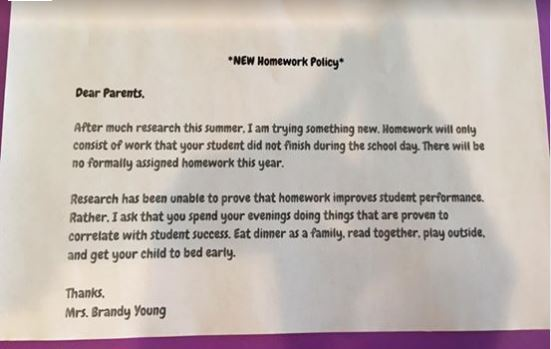Homework: Necessary or Negative?
Many people, children and adults alike, have conflicting opinions on homework. Some feel it is essential while others believe it as a waste of time.
For example, Dallas-area teacher Brandy Young sparked conversation and debate when she sent home a letter to parents announcing she was eliminating all homework in favor of families spending more time together:

One complaint about homework is that it affects sleep. For grades six and up, homework can seriously affect a young adult’s sleep habits. While some students excel in school and can whiz right through their homework, others are quite the opposite. Some spend hours upon hours doing their homework, and they have to stay up late to get it done. Research indicates that children and young adults should get at least eight hours of sleep each night, but because of homework, some students report getting less than hours of sleep each night. Without enough sleep, children and young adults may experience dry eyes, headaches, lethargy, a weakened immune system, and decreased focus throughout the day. According to asapSCIENCE, without enough sleep, students don’t only risk cognitive issues, but could also have an increased risk of heart disease, obesity, and diabetes. The struggle with homework can therefore lead to a cycle: completing homework impedes sleep, then when in school the students lack focus, so they struggle to complete the homework for the next night, forcing them to stay up later to figure it out. Then they would repeat this over and over again.
Moreover, homework tends to get in the way of relaxation and socialization. Many students like to hang out, relax, or spend time with their families on the weekends, but sometimes homework can get in the way. While students can socialize at school, there are limitations. And as students continue going into higher grades, they get more and more homework and long-term projects, which may result in less downtime. Students need to socialize. People who can’t socialize tend to struggle to make friends as easily. Feelings of social isolation can have a negative effect on the mind, as can increased stress levels. Both have been linked to depression. According to asapSCIENCE, when a person becomes depressed, a section of the brain shrinks, little by little. That section is the hippocampus, the area that controls memory and emotion–both important to a student’s achievement.
Despite these drawbacks, homework also has a good side, too. Homework teaches children to work on their own, manage timelines and deadlines, and problem solve independently. These are important skills to have in preparation for college and careers. Homework also helps with academic progress. The more someone writes, reads, or thinks about a certain topic, the more it imprints into memory. Repeated practice helps students to memorize and recall information later on. According to Jennifer Atkinson, homework “reinforces skills, concepts and information learned in class, prepares students for upcoming class topics, teaches students to work independently and develop self-discipline, and encourages students to take initiative and responsibility for completing a task.” She adds that homework additionally “allows parents to have an active role in their child’s education and evaluate their child’s progress.” Atkinson does note, however, that effective homework should relate what is learned in school to children’s lives outside of school and should help connect school learning to the real world.
Shrinidhi Shah, an eighth-grade student on the Hele team, states that homework has helped her master basic skills and that it affects students’ education and futures crucially. She feels it’s a great way to help students practice academic skills.
On the contrary, eighth-grader Chris Foell says homework is boring and that he often has too much–about forty-five minutes each night. While he did say homework offers valuable practice, he notes that it’s easy to forget assignments and due dates.
Connor Gdovin of Team Ignite agrees. He said, “I like to play outside and be with friends. I play a lot of sports, and sometimes homework doesn’t fit in.” Another Ignite student, who chose to remain anonymous, added that homework is time-consuming, often taking an hour or more a night, and that there’s no one there to help if he doesn’t understand.
Teachers are divided in their opinions as well. Mrs. DeMello, an intervention specialist for the eighth-grade Hele team, states that homework has value when a student needs to practice a certain skill. She believes that if it isn’t just busy work, it can improve a student’s confidence by giving them practice that will reinforce skills.
Science teacher Mr. Lubin says he’s “not a big fan” of homework. He explains that there are so many others things to do in the evenings: family, sports, activities, and entertainment. He also pointed out that there are flaws with much of the homework that teachers assign; it can be easily copied, googled, or replicated so that limited learning actually takes place.
In the end, teachers must weigh the value of a homework assignment against the costs to students’ personal time, stress levels, and school-life balance.







